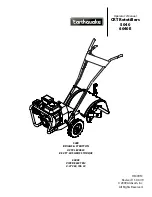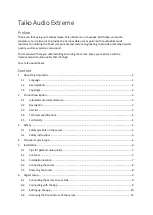
G
uar
di
an
F
al
l P
ro
te
ct
io
n
63
05
S
. 2
31
st
St
.,
Ken
t,
W
A
9
80
32
2
Product Specific Applications
Personal Fall Arrest:
External Shock Lanyards may be used to support a MAXIMUM 1 personal fall
arrest system (PFAS) for use in Fall Arrest applications. Structure must withstand loads applied in
the directions permitted by the system of at least 5,000 lbs. Maximum free fall is 6‘. Applicable
D-ring: Dorsal.
Restraint:
External Shock Lanyards may be used in Restraint applications. Restraint systems prevent
workers from reaching the leading edge of a fall hazard. Always account for fully deployed length
of lanyard/SRL. Structure must withstand loads applied in the directions permitted by the system
of at least 1,000 lbs. No free fall is permitted. Restraint systems may only be used on surfaces with
slopes up to 4/12 (vertical/horizontal). Applicable D-rings: Dorsal, Chest, Side, Shoulder.
!
WARNING
Use of equipment in unintended applications may result in serious
injury or death. Maximum 1 attachment per connection point.
For all applications: worker weight capacity range
(including all clothing, tools, and equipment) is 130-310 lbs.
Rescue/Confined Space:
External Shock Lanyards may be used in Rescue/Confined Space
applications. Rescue systems function to safely recover a worker from a confined location or after
exposed to a fall. There are various configurations of Rescue systems depending on the type of
rescue. Structure must withstand loads applied in the directions permitted by the system of at
least 3,000 lbs. No free fall is permitted. Applicable D-rings: Dorsal, Chest, Shoulder.
Work Positioning:
External Shock Lanyards may be used in Work Positioning applications. Work
Positioning systems allow a worker to be supported while in suspension and work freely with both
hands. Structure must withstand loads applied in the directions permitted by the system of at least
3,000 lbs. Maximum allowable free fall is 2’. Applicable D-rings: Side.
Limitations
Fall Clearance:
There must be sufficient clearance
below the anchorage connector to arrest a fall
before the user strikes the ground or an
obstruction. When calculating fall clearance,
account for a MINIMUM 2’ safety factor,
deceleration distance, user height, length of
lanyard/SRL, harness stretch, and all other
applicable factors.
Diagram shown is an example fall clearance
calculation ONLY.
Swing Falls:
Prior to installation or use, make
considerations for eliminating or minimizing
all swing fall hazards. Swing falls occur when
the anchor is not directly above the location
where a fall occurs. Always work as close to
in line with the anchor point as possible.
Swing falls significantly increase the
likelihood of serious injury or death in the
event of a fall.
Fall clearance calculation shown based on standing
worker falling directly in-line with anchor point.
Always consider potential swing fall and other
hazards when calculating fall clearance.
*Eliminate Swing Fall whenever
possible! If Swing Fall exists,
always account for additional
fall clearance.
2’


























